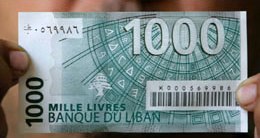
Lebanon’s economy may grow more than 5 percent this year as money floods into the country, cutting borrowing costs and enabling the central bank to maintain investment incentives, the central bank’s Vice Governor Saad Andary said.
“I am confident we are going to replicate last year’s growth rate,” Andary said in an interview in Beirut today. “Interest rates have dropped and banks are flush with liquidity.”
Lebanese banks received more than $1.5 billion a month from abroad in 2009 as they kept interest rates on deposits in Lebanese pounds at about 7 percent, while rates elsewhere in the world tumbled. The inflow of funds enabled the central bank to reduce reserve requirements on lending for housing, health-care, education, environmental projects and start-up businesses.
Growth this year will be led by real estate and tourism, after the economy expanded about 9 percent in 2009 and 8.5 percent in 2008, Andary said. Finance Minister Raya Haffar el- Hassan said on Dec. 14 that the economy grew about 7 percent last year, an estimate echoed by the International Monetary Fund.
Credit leaped about 16 percent in 2009 and is likely to rise by a similar amount this year, Governor Riad Salameh said in an interview on Jan. 20. The economy he estimated would grow at least 4 percent this year.
Liquidity
The interest rate on three-year Lebanese pound treasury bills has fallen to 6.6 percent from about 9.3 percent in 2008, Andary said.
Lebanon’s central bank resumed the sale of certificates of deposit in March to help absorb excess liquidity in the banking system and keep control of inflation, which Salameh estimates will be 3 percent or lower this year. The bank also reduced the overnight lending rate to 2.75 percent from 3.25 percent last month to try and curtail inflows.
Lebanon’s foreign currency reserves, excluding gold, exceed $30 billion, Andary said. The country has additional gold reserves of about $10 billion, he said. BW

Leave a Reply
You must be logged in to post a comment.